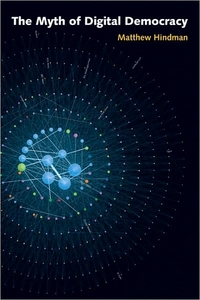

Purchase
Princeton University Press
November 2008
On Sale: October 27, 2008
198 pages
ISBN: 0691138680
EAN: 9780691138688
Paperback
Add to Wish List
Non-Fiction
Is the Internet democratizing American politics? Do
political Web sites and blogs mobilize inactive citizens and
make the public sphere more inclusive? The Myth of Digital
Democracy reveals that, contrary to popular belief, the
Internet has done little to broaden political discourse but
in fact empowers a small set of elites--some new, but most
familiar. Matthew Hindman argues that, though hundreds of
thousands of Americans blog about politics, blogs receive
only a miniscule portion of Web traffic, and most blog
readership goes to a handful of mainstream, highly educated
professionals. He shows how, despite the wealth of
independent Web sites, online news audiences are
concentrated on the top twenty outlets, and online
organizing and fund-raising are dominated by a few powerful
interest groups. Hindman tracks nearly three million Web pages, analyzing how
their links are structured, how citizens search for
political content, and how leading search engines like
Google and Yahoo! funnel traffic to popular outlets. He
finds that while the Internet has increased some forms of
political participation and transformed the way interest
groups and candidates organize, mobilize, and raise funds,
elites still strongly shape how political material on the
Web is presented and accessed. The Myth of Digital Democracy. debunks popular notions about
political discourse in the digital age, revealing how the
Internet has neither diminished the audience share of
corporate media nor given greater voice to ordinary citizens.
Comments
No comments posted.
Registered users may leave comments.
Log in or register now!
| 


 © 2003-2025 off-the-edge.net
all rights reserved Privacy Policy
© 2003-2025 off-the-edge.net
all rights reserved Privacy Policy